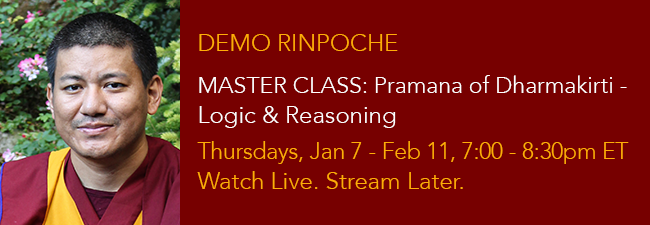
Reasoning and logic are essential in order to reveal what is in fact true and reliable knowledge. Pramana is a Sanskrit term that Hindu, Buddhist, and Jainist traditions use to refer to the elements necessary to recognize how knowledge is understood, and how its veracity and reliability can be ascertained.
Drawing from Dharmakirti’s Compendium of Valid Cognition, Demo Rinpoche will explain various methods to help gain reliably true knowledge of the nature of reality as well as be able to discern the diverse understandings people may reach.
About Demo Rinpoche
DATES/TIMES
Thursdays, 7:00 – 8:30pm ET
January 7, 14, 21, 28 and February 4, 11, 2021
Cost: $60
SUPPORTIVE READING OPTIONS
Books:
Science and Philosophy in the Indian Buddhist Classics, Volume 2 – The Mind; conceived and introduced by His Holiness the Dalai Lama; Edited by Thupten Jinpa; Simon & Schuster; 2020
Pramana: Dharmakirti and the Indian Philosophical Debate by Lama Doboom Tulku and Maya Joshi (available to order)
The Pramanavarttikam of Dharmakirti; S. Mookerjee and Hojun Nagasaki; Nava Nalanda Mahavihara Publication; 1964
A Compendium of Ways of Knowing: A Clear Mirror of what should be Accepted and Rejected by Akya Yong-dzin Yang-chan ga-wai lo-dro, with commentary compiled from oral teachings by Geshe Ngawang Dhargey (book out of print)
Online:
Compendium of Ways of Knowing Text:
https://studybuddhism.com/en/tibetan-buddhism/original-texts/sutra-texts/compendium-of-ways-of-knowing – Study Buddhism by Berzin Archives
Commentary on “Compendium of Ways of Knowing” – Geshe Ngawang Dhargyey:
https://studybuddhism.com/en/advanced-studies/science-of-mind/ways-of-knowing/commentary-on-compendium-of-ways-of-knowing-geshe-ngawang-dhargyey
Lorig: Ways of Knowing – Alexander Berzin
https://studybuddhism.com/en/advanced-studies/science-of-mind/ways-of-knowing/lorig-ways-of-knowing
Elaboration of Lorig: Ways of Knowing -– Alexander Berzin
https://studybuddhism.com/en/advanced-studies/science-of-mind/ways-of-knowing/elaboration-of-lorig-ways-of-knowing
“Internet Archive” – Translation:
https://archive.org/details/AStudyOfDharmakirtisPramanavarttikaMasatoshiNagatomi/page/n33/mode/2up
Geshe Yeshe Thabkhe teachings on Dharmakirti’s commentary on Dignaga’s Compendium on Valid Cognition:
https://thubtenchodron.org/buddhism/debate-and-reasoning/pramanavarttika-with-geshe-yeshe-thabkhe/
Chapter 2 Institute for Buddhist Dialectics, Dharamsala (2014) – Geshe Wangmo
http://ibd-buddhist.blogspot.com/2014/10/pramanavarttika-1st-term-fall-2014.html
Supporting materials:
http://ibd-buddhism.org/Pramana/PDF/2014PRAMANA-INTRO-v4.pdf
http://ibd-buddhism.org/Pramana/PDF/2014Pramana-CHART01.pdf
http://ibd-buddhism.org/Pramana/PDF/20141001Class01.pdf
Track 1 – Introduction to Text materials compiled and translated by Geshe Wangmo for the Course.
http://ibd-buddhism.org/Pramana/2014FALL01/20141001C01T1.mp3
Track 2 – Life Story of Dignaga
http://ibd-buddhism.org/Pramana/2014FALL01/20141001C01T2.mp3
Track 3 – Life Story of Dharmakirti
http://ibd-buddhism.org/Pramana/2014FALL01/20141001C01T3.mp3
Chapter 2 – Institute for Buddhist Dialectics – (2018)
http://ibd-buddhist.blogspot.com/



